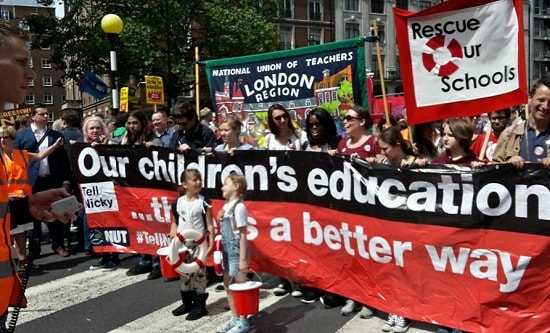
The Labour Manifesto includes some ambitious plans to change the miserable state of the education system in Britain. It proclaims it will create a ‘National Education Service’, bring academies back under local authority control, scrap tuition fees, introduce six years of free learning for adults, reduce testing in schools and reintroduce the Education Maintenance Allowance. The promise to replace Ofsted will appeal to many tired of sterile, data driven education, although exactly how the new body will be different is not clear. Some of Labour’s more radical plans, such as the proposal agreed at conference to ‘integrate private schools’ into the state system, have been watered down even in this ‘most radical’ manifesto. The Social Justice Commission, which will replace the Social Mobility Commission under Labour, will merely be asked to ‘advise on integrating private schools’ [our emphasis], and any mention of seizing private schools’ assets and redistributing them ‘democratically and fairly’ have disappeared.
The education system in Britain is clearly in urgent need of radical change. According to research by the National Education Union, 83% of schools in real terms will have less money in 2020 than in 2015. As a result of the past ten years’ vicious cuts, over 8,500 children with SEND (special educational needs and disabilities) are being denied access to an education while waiting for ‘appropriate educational provision’. Will Labour live up to its promises to restore the desperately needed funding after failing to mobilise any real resistance to austerity for the past ten years?
Thousands more working class children, especially those from BME backgrounds, are also being deprived of learning, having been excluded by head teachers ‘cracking down on bad behaviour’ (see FRFI 270). There is no mention of this systematic injustice and racism in the manifesto, which only mentions ending ‘off-rolling’, the practice of unofficially excluding children.
Meanwhile Department for Education figures show 69% of secondary and 33 % of primary schools are now academies, the majority having been forced to convert, often despite determined protests by staff, pupils and parents. Once converted, academy trusts can pay their CEOs huge salaries – at least 146 academy trusts paid at least one person £150,000 or more in 2017-18 – while underpaying teaching staff and funnelling money into private companies. The Wakefield City Academies Trust (WCAT), which closed in October this year after stripping millions of pounds from the 21 schools in its trust, is an example of the corruption of this system. In October 2016, WCAT’s then chief executive Mike Ramsay paid almost £440,000 to an IT company which he and his daughter owned, and paid himself £82,000 for only 15 weeks of work, while the trust had a huge budget deficit. Now WCAT has collapsed, the schools it had been running will not see a penny of the millions leached from their capital investment funds and Christmas fundraisers.
We must remember that Labour has failed on the frontlines of the battle for an education today: while in supposed opposition, Labour councils were willing executioners of the cuts, and in many cases colluded with the conversion of schools into academies, against the wishes of parents and teachers, rather than build those local campaigns. The question is how far would a Labour government pursue its ambitions in conditions of crisis? Waiting on it is not an option: teachers and school staff have to organise to fight those who stand in the way of high-quality education provision for all.
Ruby Most
Fight Racism! Fight Imperialism! 273 December 2019/January 2020




